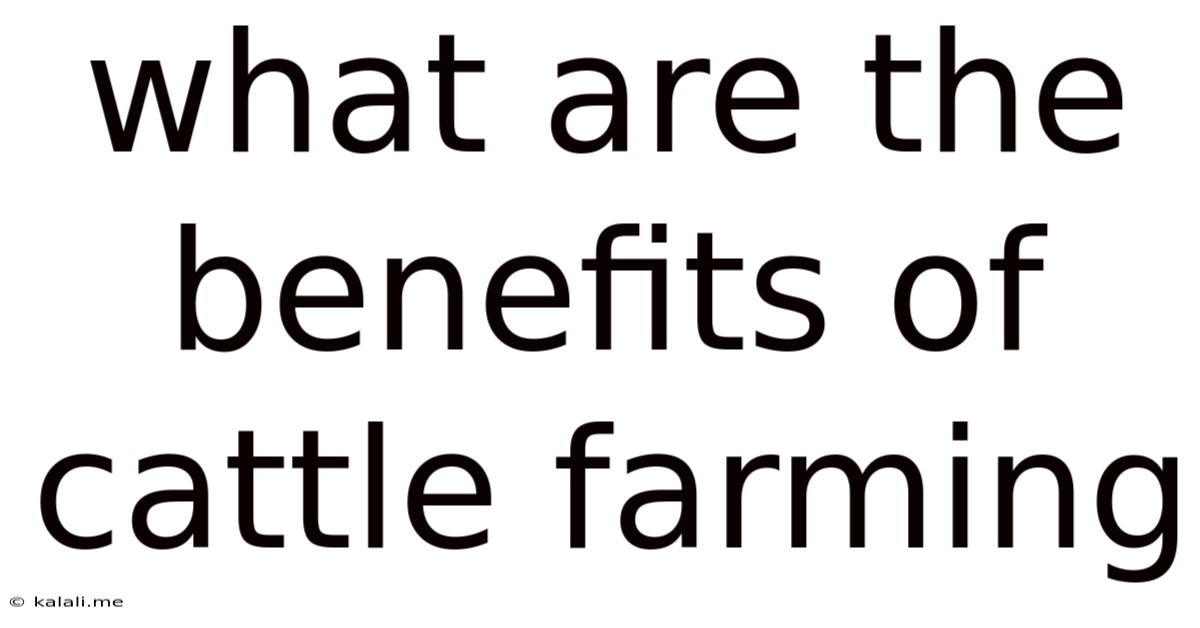What Are The Benefits Of Cattle Farming
Kalali
Jun 13, 2025 · 3 min read

Table of Contents
The Bovine Bounty: Unveiling the Numerous Benefits of Cattle Farming
Cattle farming, often overlooked as simply a meat production industry, offers a surprisingly diverse range of benefits extending far beyond the dinner plate. This comprehensive guide delves into the multifaceted advantages of this agricultural practice, encompassing economic contributions, environmental impacts (both positive and negative), and its role in sustaining rural communities. Understanding these benefits allows for a more nuanced perspective on the importance of cattle farming within the global food system and beyond.
Economic Advantages: A Multi-Billion Dollar Industry
The economic contributions of cattle farming are undeniable. It's a major driver of economic growth in many regions, providing livelihoods for millions through direct employment on farms and ranches, and indirectly through related industries such as feed production, transportation, processing, and retail.
- Job Creation: From ranchers and farmers to veterinarians, feed suppliers, and meat processors, the cattle industry supports a vast workforce across the supply chain.
- Revenue Generation: Cattle farming generates significant revenue through the sale of beef, dairy products (milk, cheese, yogurt), and by-products like leather and fertilizer. This revenue contributes significantly to local, national, and global economies.
- Investment Opportunities: Cattle ranching and farming present opportunities for investment, attracting both small-scale and large-scale investors.
Environmental Contributions: A Complex Relationship
The environmental impact of cattle farming is a complex and often debated topic. While it's true that intensive cattle farming can contribute to greenhouse gas emissions and deforestation, sustainable practices can significantly mitigate these negative effects.
- Manure as Fertilizer: Cattle manure is a valuable natural fertilizer, enriching soil and reducing the need for synthetic fertilizers, which can have harmful environmental impacts.
- Grazing Management: Rotational grazing techniques can improve pasture health, prevent soil erosion, and enhance biodiversity. Sustainable grazing practices can even contribute to carbon sequestration.
- Land Management: Cattle ranching can play a crucial role in managing land that is unsuitable for other agricultural uses, preventing land degradation and promoting biodiversity in specific ecosystems. This is particularly true in areas with challenging terrains.
Social and Cultural Significance: A Way of Life
Beyond the economic and environmental aspects, cattle farming holds significant social and cultural value in many communities worldwide.
- Rural Community Sustainability: Cattle farming is often central to the economies of rural communities, providing jobs and income that help sustain these areas.
- Cultural Heritage: In numerous cultures, cattle farming is deeply intertwined with traditions, customs, and social structures, contributing to the preservation of cultural heritage.
- Food Security: Cattle farming contributes significantly to food security by providing a vital source of protein and nutrients for a significant portion of the global population.
Addressing Concerns: Sustainable Practices for a Better Future
While cattle farming presents undeniable benefits, it’s crucial to acknowledge and address concerns related to environmental sustainability and animal welfare. Adopting sustainable practices is essential for mitigating the negative impacts and ensuring the long-term viability of the industry. This includes:
- Improved feed efficiency: Reducing methane emissions through improved feed formulations and diet management.
- Manure management: Implementing effective manure management strategies to minimize greenhouse gas emissions and nutrient runoff.
- Reduced deforestation: Promoting sustainable land management practices to reduce deforestation and habitat loss.
- Enhanced animal welfare: Implementing practices that prioritize animal health and well-being.
In conclusion, cattle farming presents a multitude of benefits spanning economic, environmental, and social spheres. While challenges exist, particularly regarding environmental impact, the adoption of sustainable practices offers a pathway towards a more responsible and sustainable future for this vital industry. Understanding the full scope of these benefits is crucial for creating informed policies and supporting the continued development of the cattle farming industry in a way that benefits both people and the planet.
Latest Posts
Latest Posts
-
How Much Does A 12 Pack Of Pop Weigh
Jul 01, 2025
-
How Many Shots In A Half Gallon
Jul 01, 2025
-
Someone Once Told Me The World Was Macaroni
Jul 01, 2025
-
How Long Does It Take To Walk Five Miles
Jul 01, 2025
-
How Many Ounces Is A Pint Of Blueberries
Jul 01, 2025
Related Post
Thank you for visiting our website which covers about What Are The Benefits Of Cattle Farming . We hope the information provided has been useful to you. Feel free to contact us if you have any questions or need further assistance. See you next time and don't miss to bookmark.